

Partage des données de la recherche : Politiques,... Data from: Mandated data archiving greatly improves access to research data. Academic Libraries and Research Data Services. November 26th, 2012 by Mary Jane Petrowski in Publications No Comments ACRL has released a new research report, “Academic Libraries and Research Data Services: Current Practices and Plans for the Future” to provide a baseline assessment of the current state of and future plans for research data services in academic libraries.
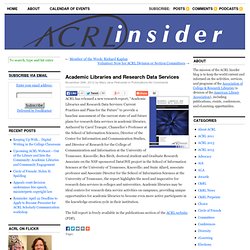
The full report is freely available in the publications section of the ACRL website (PDF). Tags: LabArchives and BioMed Central: a new platform for publishing scientific data. Introduction “One reason that the worldwide web worked was because people reused each other’s content in ways never imagined or achieved by those who created it.
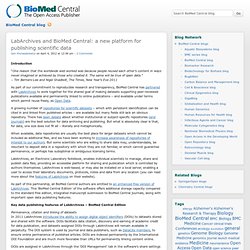
The same will be true of open data.” – Tim Berners-Lee and Nigel Shadbolt, The Times, New Year’s Eve 2011. Données libérées, chercheurs débridés, société impliquée » Article » OwniSciences, Société, découvertes et culture scientifique. A YouTube for Scientists. Sorry, we couldn't resist the title, but we also realise the irony given the general failure of the attempts to build a "facebook for Scientists".
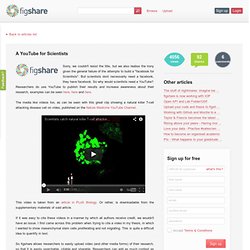
But scientists dont necessarily need a facebook, they have facebook. So why would scientists need a YouTube? Researchers do use YouTube to publish their results and increase awareness about their research, examples can be seen here, here and here. The media like videos too, as can be seen with this great clip showing a natural killer T-cell attacking disease cell on video, published on the Nature Medicine YouTube Channel. This video is taken from an article in PLoS Biology. If it was easy to cite these videos in a manner by which all authors receive credit, we wouldn't have an issue. So figshare allows researchers to easily upload video (and other media forms) of their research, so that it is easily searchable, citable and sharable.
All videos have view counts, share buttons, embed functionality as well as QR codes. Figshare: a carrot for sharing - Helping researchers share their research more quickly. Helping researchers share their research more quickly.
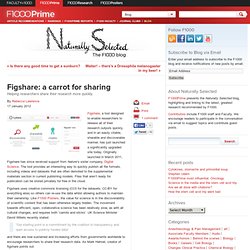
Figshare, a tool designed to enable researchers to release all of their research outputs quickly, and in an easily citable, sharable and discoverable manner, has just launched a significantly upgraded site today. Originally launched in March 2011, Figshare has since received support from Nature’s sister company, Digital Science. The tool provides an interesting way to quickly publish all file formats, including videos and datasets that are often demoted to the supplemental materials section in current publishing models.
Files that aren’t ready for publication can be stored privately for free in the cloud. Figshare uses creative commons licensing (CC0 for the datasets; CC-BY for everything else) so others can re-use the data whilst allowing authors to maintain their ownership. Citizen science project Zooniverse make data available on figshare - Technology for Researchers. February 07, 2012 It has been a couple of weeks now since figshare relaunched and the public uploads have been coming thick and fast.
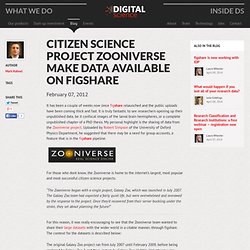
It is truly fantastic to see researchers opening up their unpublished data, be it confocal images of the larval brain hemispheres, or a complete unpublished chapter of a PhD thesis. My personal highlight is the sharing of data from the Zooniverse project. Scientific Researchers Announce Common Data Standard - Computing Now. H5N1 Research: Greater risk in publishing or withholding data? In an unprecedented move, a U.S. biosecurity review board has asked the authors of two studies creating dangerous airborne strains of the H5N1 avian flu virus—possibly transmissible among humans—not to publish the details of their experiments.
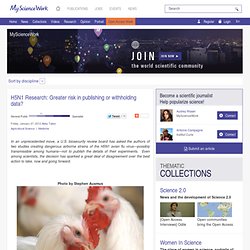
Even among scientists, the decision has sparked a great deal of disagreement over the best action to take, now and going forward. Photo by Stephen Ausmus In a lab in the Netherlands and one in the United States, there exists a virus, a highly pathogenic strain of avian flu, that experts fear could pass easily between humans, if ever it escaped. This virus, a strain of H5N1, did not evolve naturally, but was created by influenza researchers, whose work was approved and followed by the relevant authorities—including the U.S. National Institutes of Health, who funded the studies.
Panton Fellowships – apply now! Funded by Open Society Foundations, Panton Fellowships will be awarded to scientists who actively promote open data in science.
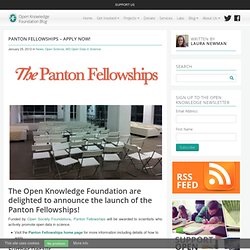
Visit the Panton Fellowships home page for more information including details of how to apply Further Details We firmly believe that “open data means better science”. Science Data Sharing Site figshare Relaunches, Adds Features. FigShare. OpenAIREplus. Are open lab notebooks considered prior publication? – Carl Boettiger. This question invariably comes up at some point in any discussion of open notebook science.
This concern is usually voiced in reference to the high-visibility magazines, which many scientists seem to assume will have very restrictive conditions. A quick read of their policies shows otherwise. Here are the links to pre-publication policies of major journals, with my short summaries & comments. Nature — Go right ahead. Explicit protection clause for open/collaborative blogs/wikis. PNAS — Nope, not prior publication here either. Science — The policy listed there sounds more conservative (phrases like “most cases” and “contact the editors” don’t inspire confidence). We allow posting on not-for-profit pre-print archives, so posting on arxiv.org is fine at any time. we ask that if you post before acceptance that you do not indicate that the paper is submitted to Science. RoMEO Colour Archiving policy Green Blue Yellow White. Archaeology Data Service: Homepage. Helping you to find, access, and reuse research data. RRResearch.
Carnets de recherche en Sciences humaines et sociales. About Science Commons. (For even more information on our history and organizational structure, click here.)
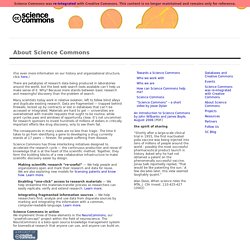
There are petabytes of research data being produced in laboratories around the world, but the best web search tools available can’t help us make sense of it. Why? Because more stands between basic research and meaningful discovery than the problem of search. Many scientists today work in relative isolation, left to follow blind alleys and duplicate existing research. Data are fragmented — trapped behind firewalls, locked up by contracts or lost in databases that can’t be accessed or integrated.
The consequences in many cases are no less than tragic. Science Commons has three interlocking initiatives designed to accelerate the research cycle — the continuous production and reuse of knowledge that is at the heart of the scientific method. MyExperiment. MyExperiment.